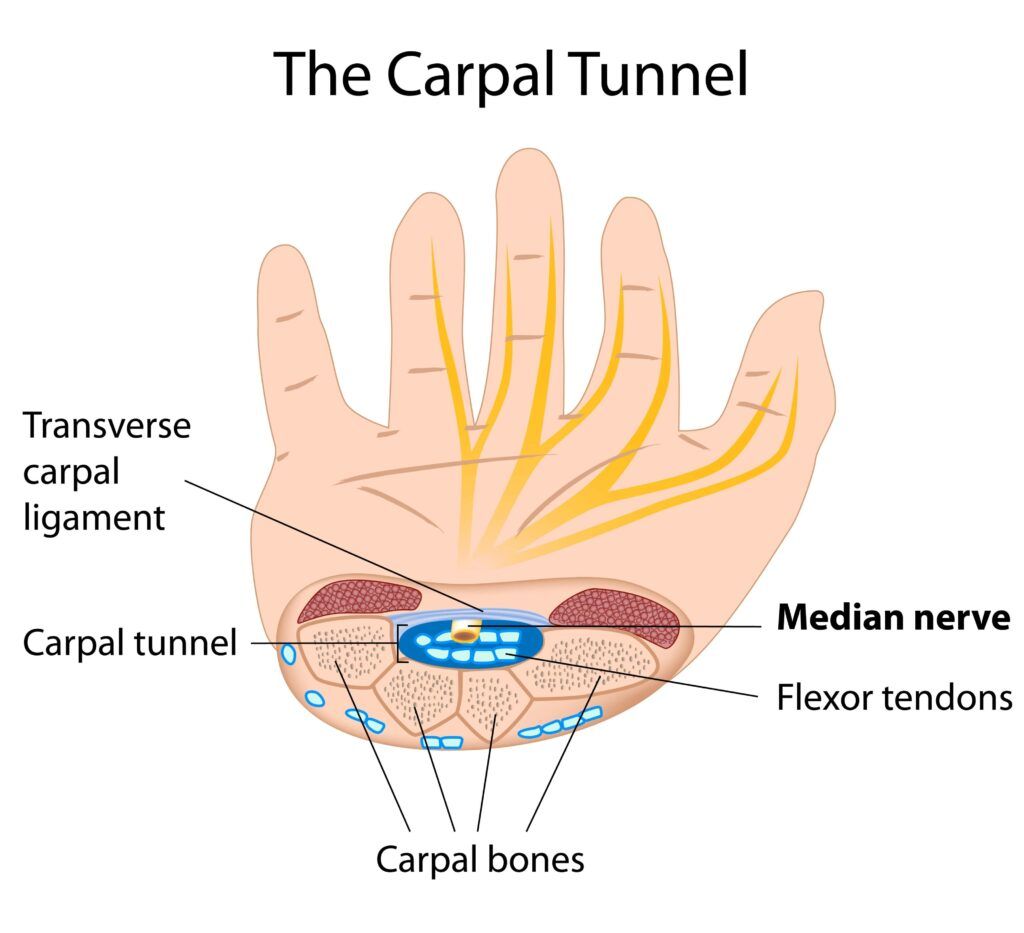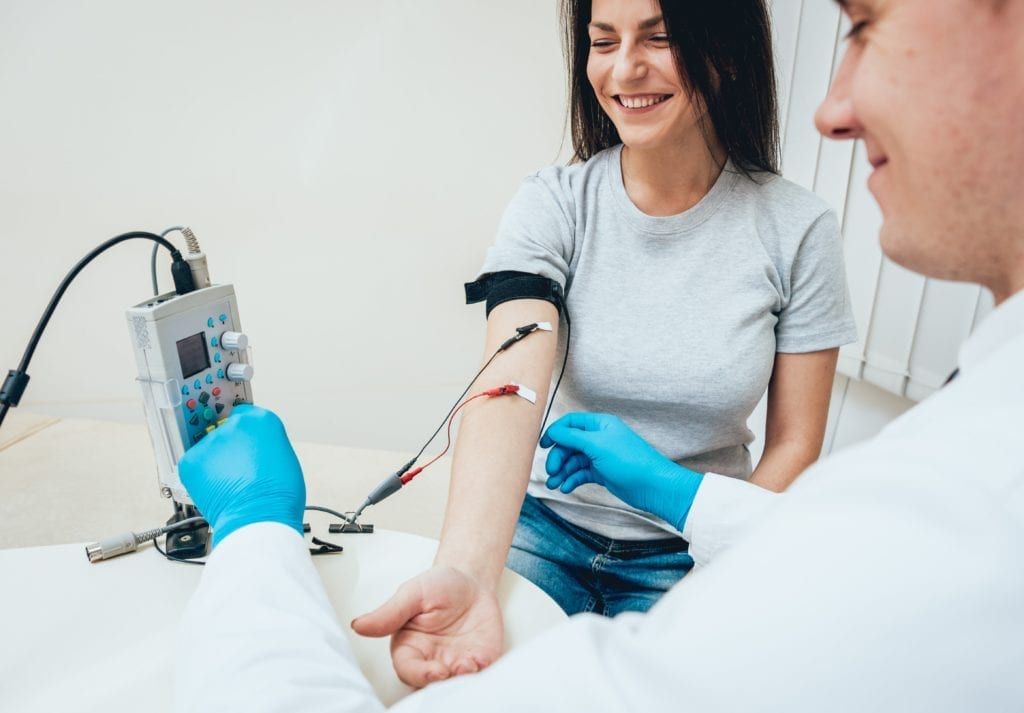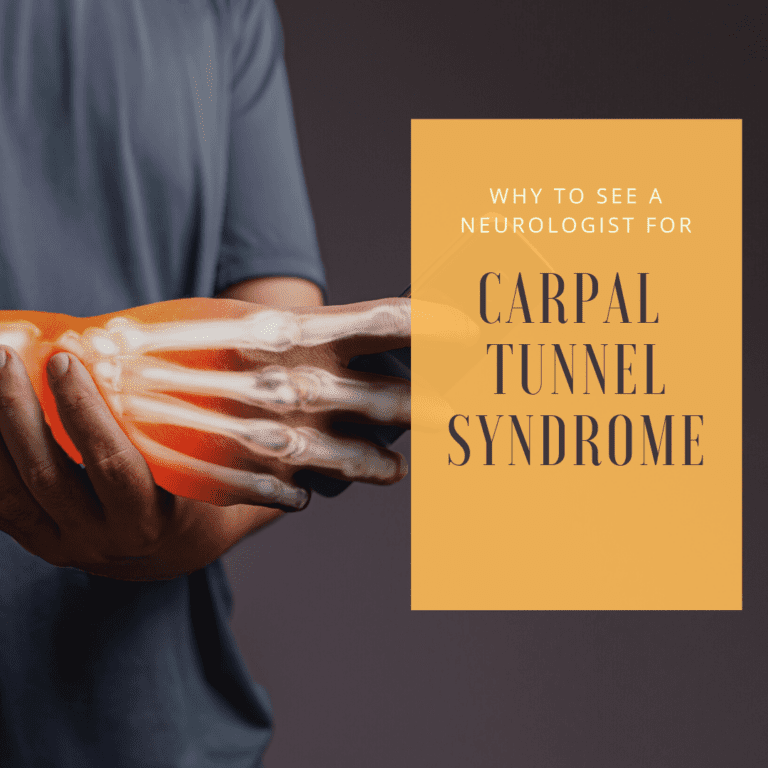When your wrist hurts chances are you don’t think about visiting a neurologist. Even if you suspect carpal tunnel syndrome, a neurologist’s office isn’t often the first place you think of scheduling an appointment. However, carpal tunnel syndrome is classified as a nerve disorder, which makes a neurologist the perfect provider to help you manage the condition. In this blog, we’ll discuss why a neurologist is best for managing carpal tunnel syndrome and what you can expect when visiting one.
What is carpal tunnel syndrome?
Before getting into why you should see a neurologist, let’s take a deeper look at carpal tunnel syndrome. Carpal tunnel syndrome occurs when the median nerve becomes compressed or squeezed at the wrist. Your median nerve, as well as nine tendons, travel through the carpal tunnel. The carpal tunnel is made up of multiple wrist bones and the transverse carpal ligament.

Median nerve compression can be due to joint inflammation, nerve inflammation, thickening of the transverse carpal ligament, tendon inflammation, a cyst within the carpal tunnel, or underlying conditions that cause swelling in the wrist. Some conditions associated with carpal tunnel syndrome include: thyroid disorders, rheumatoid arthritis, diabetes, fluid retention, high blood pressure, or wrist trauma.
Additionally, repetitive hand movements such as typing on a computer or playing an instrument, have also been found to cause swelling and nerve compression. Poor wrist positioning while typing and prolonged exposure to vibrating power tools have also been known to contribute to swelling and nerve compression in the wrist.
Symptoms of carpal tunnel syndrome
Many people experience symptoms associated with carpal tunnel syndrome for months and even years before they realize there’s a problem. Symptoms of carpal tunnel syndrome include:
- numbness, tingling or pain in the thumb and first three fingers
- muscle weakness or clumsiness in the hand
- weakness in the thumb
- sharp shooting pains through the wrist and forearm
- loss of grip strength
- wrist pain that interferes with sleep
Why to See a Neurologist for Carpal Tunnel Syndrome
If you suspect that you have carpal tunnel syndrome or if you’ve already been diagnosed, you may be wondering what to do next. For starters, it is recommended to schedule an appointment with a neurologist as soon as you notice symptoms associated with carpal tunnel syndrome. This is because early diagnosis and treatment has much better treatment outcomes as compared to waiting until the pain is unbearable.
When you schedule an appointment with your local neurologist to be examined for carpal tunnel syndrome, they will perform a physical examination and ask you about your symptoms. If carpal tunnel syndrome is suspected by your neurologist, then they will perform a specialized test known as an electrodiagnostic study. There are two parts of an electrodiagnostic study, including:

- Nerve Conduction Study: A series of surface electrodes are placed at various locations along specific peripheral nerves for this test. The nerve is stimulated in one place and recorded at a different location to see if it is functioning properly. Each electrical stimulation is documented by the neurologist on a computer system and carefully evaluated.
- Needle electromyography (EMG): This part of the exam assesses both nerve and muscle functions. A tiny-diameter concentric needle is inserted into a muscle to check insertional activity, resting activity, voluntary recruitment, morphology, and motor unit size. The needle electrode examination provides important information on the electrical properties of individual muscle fibers and motor units, as well as fiber integrity and innervation.
It is important to note that neurologists have advanced training that allows them to perform test tests and accurately evaluate the results. Not only that, but your neurologist will be able to provide effective treatments to relieve symptoms associated with nerve compression.
Treatment of carpal tunnel syndrome
Initially, many people attempt to manage their symptoms through non-invasive measures. Treatments may include: resting the wrist; applying ice packs or taking over the counter pain relievers; wearing splints that help reduce pressure on median nerve; using electronic devices with adjustable keyboards and ergonomic mouse pads; changing techniques when working with the hands, such as taking frequent breaks while typing on a computer; and avoiding repetitive hand movements.
Other non-invasive treatment options can include:
- Corticosteroids to reduce inflammation
- Carpal tunnel steroid injections to reduce inflammation, swelling, and pain
If these initial non-invasive treatments are not effective in managing your symptoms associated with carpal tunnel syndrome, you may need to consider surgery for carpal tunnel syndrome which can provide faster relief of pain. This is known as carpal tunnel release surgery, and it typically involves severing the ligament that is compressing the median nerve.
During surgery, a small incision is made in the palm of your hand to access the carpal tunnel. Your surgeon will protect surrounding nerves before making an incision in the wrist to release pressure on the median nerve at this crucial location near where it passes through a narrow channel in the wrist. Surgical intervention is normally a permanent solution to ending symptoms associated with carpal tunnel syndrome.
In Conclusion:
In conclusion, carpal tunnel syndrome is a nerve compression that can be painful and debilitating. Luckily, there are lots of treatments available to help manage symptoms associated with it. If you’re experiencing consistent pain or numbness in your hands due to carpal tunnel syndrome, make an appointment with a neurologist who has extensive training and experience diagnosing and treating neurological disorders such as carpal tunnel syndrome.

Dr. Kashouty, a diplomate of the American Board of Psychiatry and Neurology (ABPN), practices general neurology with fellowship trained specialization in clinical neurophysiology. Dr. Kashouty finds the form and function of the nerves and muscles the most interesting part of neurology, which is what led him to specialize in neurophysiology with more emphasis on neuromuscular conditions. He treats all neurological diseases, but his main focus is to treat and manage headaches, movement disorders and neuromuscular diseases.




